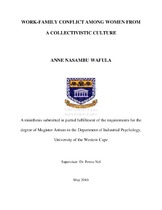| dc.contributor.advisor | Nel, Petrus | |
| dc.contributor.author | Wafula, Anne Nasambu | |
| dc.contributor.other | Dept. of Industrial Psychology | |
| dc.contributor.other | Faculty of Arts | |
| dc.date.accessioned | 2013-08-07T09:20:08Z | |
| dc.date.available | 2011/10/20 08:14 | |
| dc.date.available | 2011/10/20 | |
| dc.date.available | 2013-08-07T09:20:08Z | |
| dc.date.issued | 2010 | |
| dc.identifier.uri | http://hdl.handle.net/11394/1817 | |
| dc.description | Magister Artium (Psychology) - MA(Psych) | en_US |
| dc.description.abstract | This study investigated how Work-Family Conflict was related to Role Salience and Job level (investigated in terms of the amount of job demand and job control associated with different job levels) among women from a Collectivistic culture. A sample of 65 teachers was used. Although the results of the study showed no correlations between Work-Family Conflict and both role salience and job level, this was attributed to the high data skewness, thereby reducing the chances of detecting correlations. The high positive data skewness was possibly caused by the floor effect, which was the situation that the sample consisted of only female teachers from a Collectivistic culture. The high negative data skewness was possibly caused by the ceiling effect, which is the situation that the women in this sample have a Collectivistic cultural orientation, and are therefore highly likely to consider their home role as more salient. Moreover, correlations between Work Family Conflict and Job demand have been found to be higher in Individualistic cultures compared to Collectivistic cultures. There also seems to be no differences in job control among teachers occupying different job levels, and hence, no correlations were detected. Further analyses depicted that the teachers within this sample considered their home role as more salient. Moreover, despite their commitment to both their home role and occupational role, the data indicated that the sample experienced low levels of Work Family conflict. | en_US |
| dc.language.iso | en | en_US |
| dc.publisher | University of the Western Cape | en_US |
| dc.subject | Work-Family Conflict | en_US |
| dc.subject | Women | en_US |
| dc.subject | Teachers | en_US |
| dc.subject | Collectivistic Culture | en_US |
| dc.subject | Role Salience | en_US |
| dc.subject | Job Level | en_US |
| dc.subject | Demands Control Theory of Strain | en_US |
| dc.subject | Job Demand | en_US |
| dc.subject | Job Control | en_US |
| dc.subject | Collectivism Scales | en_US |
| dc.title | Work-family conflict among women from a collectivistic culture | en_US |
| dc.type | Thesis | en_US |
| dc.rights.holder | University of the Western Cape | en_US |
| dc.description.country | South Africa | |

